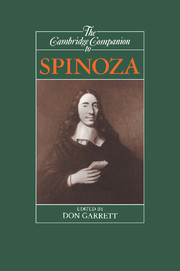Book contents
- Frontmatter
- Introduction
- 1 Spinoza's life and works
- 2 Spinoza's metaphysics
- 3 Spinoza's theory of knowledge
- 4 Spinoza's natural science and methodology
- 5 Spinoza's metaphysical psychology
- 6 Spinoza's ethical theory
- 7 Kissinger, Spinoza, and Genghis Khan
- 8 Spinoza's theology
- 9 Spinoza and Bible scholarship
- 10 Spinoza's reception and influence
- Bibliography
- Index
Introduction
Published online by Cambridge University Press: 28 May 2006
- Frontmatter
- Introduction
- 1 Spinoza's life and works
- 2 Spinoza's metaphysics
- 3 Spinoza's theory of knowledge
- 4 Spinoza's natural science and methodology
- 5 Spinoza's metaphysical psychology
- 6 Spinoza's ethical theory
- 7 Kissinger, Spinoza, and Genghis Khan
- 8 Spinoza's theology
- 9 Spinoza and Bible scholarship
- 10 Spinoza's reception and influence
- Bibliography
- Index
Summary
In many ways, Benedict (Baruch) de Spinoza appears to be a contradictory figure in the history of philosophy. From the beginning, he has been notorious as an “atheist” who seeks to substitute Nature for a personal deity; yet he was also, in Novalis's famous description of him, “the God-intoxicated man.” He was an uncompromising necessitarian and causal determinist, whose ethical ideal was to become a “free man.” He maintained that the human mind and the human body are identical; yet he also insisted that the human mind can achieve a kind of eternality that transcends the death of the body. He has been adopted by Marxists as a precursor of historical materialism, and by Hegelians as a precursor of absolute idealism. He was a psychological egoist, proclaiming that all individuals necessarily seek their own advantage above all else and implying that other individuals were of value to himself only insofar as they were useful to him; yet his writings aimed to promote human community based on love and friendship, he had many devoted friends, and even his critics were obliged to acknowledge that his personal conduct was above reproach. He held that the state has the right to do whatever it has the power to do, while at the same time he defended democracy and freedom of speech.
- Type
- Chapter
- Information
- The Cambridge Companion to Spinoza , pp. 1 - 12Publisher: Cambridge University PressPrint publication year: 1995
- 1
- Cited by



